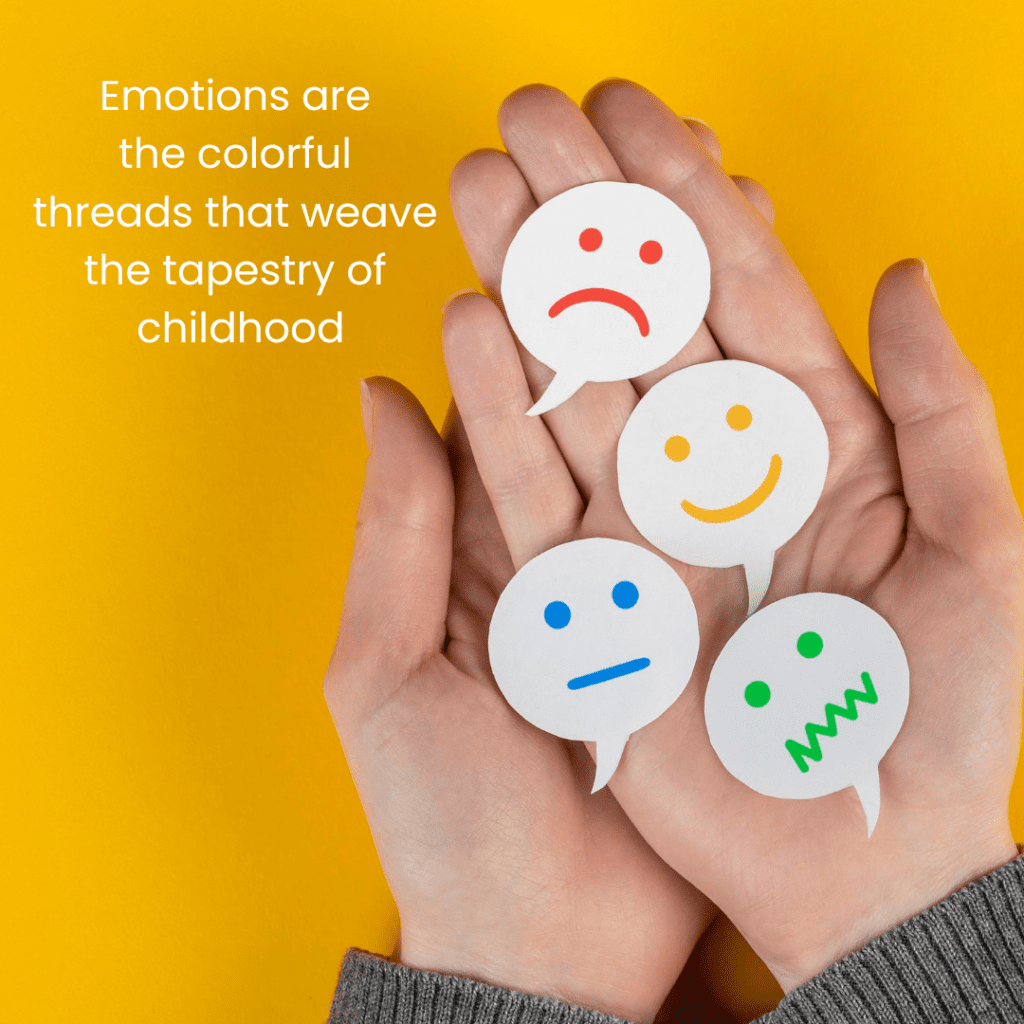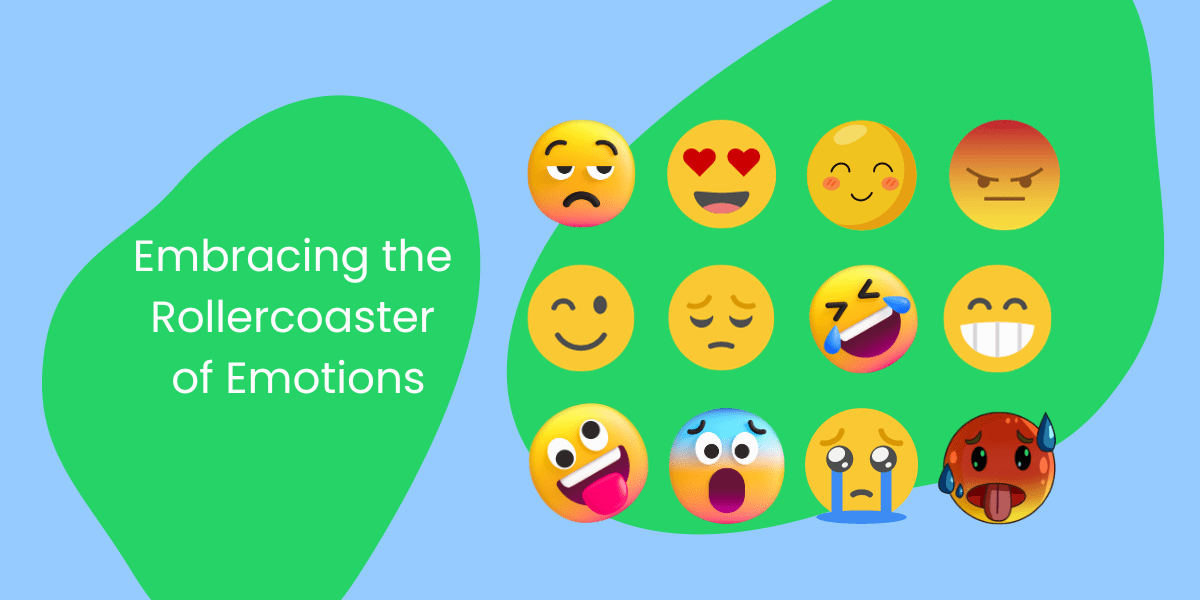Children and their emotions are truly fascinating and intricate. As young individuals, kids go through a rollercoaster of emotions every day. From pure joy and excitement to frustration and sadness, their emotional journey is always evolving. Your kid’s emotional well-being is of utmost importance for parents and caretakers to create a warm and supportive environment where children feel comfortable expressing their emotions freely. By acknowledging and validating their feelings, we empower kids to develop emotional intelligence and learn effective ways to manage their emotions. Encouraging open communication and offering support during times of emotional distress helps children cultivate resilience and healthy coping strategies. Understanding the complex world of children’s emotions is an essential aspect of their overall growth and development. In this blog, we will go through why your kid’s emotional well-being is important.
Why it’s Important to Talk to Your Kids About Expressing Their Feelings
One of the most crucial aspects of a child’s emotional development is the ability to express their feelings effectively. As parents and caretakers, it is our responsibility to create an open and supportive environment where children feel comfortable sharing their emotions. By encouraging open and honest communication about their feelings, we empower them to develop emotional intelligence and build strong relationships. Try following some tips from Raising Children Network, where they help you how to understand and manage their emotions effectively.
To Enhance Their Emotional intelligence:

When children are encouraged to express their feelings, they learn to identify and understand their emotions better. This self-awareness is a fundamental aspect of emotional intelligence. By being able to recognize and label their feelings, children can begin to regulate and manage them in a healthy way.
To strengthen their relationships with others:
Another reason why your kid’s emotional well-being is important is the early stages of respectful communication to effectively build the foundation of any healthy relationship. By teaching children to express their feelings, we equip them with the tools to communicate their needs, desires, and boundaries. This allows them to build strong and meaningful connections with their peers, family members, and future romantic partners.
The consequences of not addressing your child’s emotions
Increased likelihood of emotional suppression:
When children are not encouraged to express their feelings, they may internalize their emotions, leading to emotional suppression. This can have detrimental effects on their mental and emotional well-being. Suppressing emotions can lead to increased stress, anxiety, and even depression. It is important to create a safe space for children to express themselves openly to prevent these negative consequences.
Difficulty in forming healthy relationships:
If children are not taught how to express their feelings, they may struggle to communicate effectively in their relationships. They may have difficulty expressing their needs and boundaries, leading to misunderstandings and conflicts. By addressing their emotions and teaching them healthy ways of expression, we set them up for success in their future relationships. Read our post about Understanding Teenage Relationships and Dating for more info on healthy relationships.
Talking to younger children about why their emotional well-being is important
Use simple language and visual aids:
Younger children may not have a fully developed vocabulary to express their feelings. Using simple language and visual aids can help them understand and communicate their emotions. For example, you can use pictures or drawings to depict different emotions and ask them to identify how they feel.
Engage in pretend play to explore emotions:
Young children often learn best through play. Engaging in pretend play can help them explore and understand different emotions. You can use dolls or stuffed animals to act out scenarios that elicit various feelings. This allows children to express and process their emotions in a safe and playful environment.
Approaching teenagers about their emotions and why its important
Respect their privacy and provide a safe space for expression:
Teenagers value their privacy and may be hesitant to share their emotions openly. It is important to respect their boundaries while still providing a safe space for them to express themselves. Let them know that you are always there to listen and support them, but also give them the freedom to choose when and how they want to share.
Encourage journaling or creative outlets for emotional release:

Teenagers often find solace in writing or creative outlets. Encourage them to journal or express their emotions through art, music, or any other form of creative expression. These outlets can provide a healthy and private way for teenagers to process their emotions and find emotional release.
Creating a supportive environment for emotional expression:
Creating a supportive environment for emotional expression is essential for children’s overall well-being. When children feel safe and supported in expressing their feelings, they develop emotional intelligence and learn effective ways to manage their emotions. As parents and caretakers, it is our responsibility to acknowledge and validate their emotions, empowering them to navigate their emotional journey with resilience. By encouraging open communication and offering support during times of emotional distress, we help children cultivate healthy coping strategies and build strong relationships. Active listening, validation, and modelling healthy emotional expression are key components of creating this supportive environment. Additionally, teaching children relaxation techniques and problem-solving skills equips them with valuable tools for emotional well-being. By prioritizing their emotional development, we gift children with the skills they need to thrive and navigate the complexities of their emotions.
Active listening and validation:
When your child expresses their feelings, practice active listening by giving them your undivided attention. Show empathy and validate their emotions, even if you don’t fully understand or agree with them. This helps children feel heard and understood, fostering a sense of emotional safety.
Encouraging open communication:
Model healthy emotional expression yourself by openly sharing your own feelings and experiences. Establish regular check-ins with your child to discuss their feelings and concerns. This consistent communication creates a trusting and open environment where they feel comfortable expressing themselves.
Teaching your kids healthy ways to cope with emotions
Teaching relaxation techniques:
Help your children develop effective strategies to manage and regulate their emotions. Explain how important their emotional well-being is by teaching them relaxation techniques such as deep breathing exercises or guided imagery. These techniques can help children calm themselves when they are feeling overwhelmed or anxious.
Promoting problem-solving skills:
Encourage your children to develop problem-solving skills when dealing with challenging emotions. Teach them to brainstorm solutions and consider the consequences of their actions. By empowering them to find constructive ways to address their emotions, you are equipping them with lifelong skills for emotional well-being.
Seeking professional help when necessary
Signs that your child may benefit from therapy:
It is essential to recognize when your child may need additional support beyond what you can provide as a parent. Persistent and intense emotional struggles, difficulty functioning in daily activities, or prolonged periods of distress may indicate that therapy could be beneficial for your child. Have an open conversation explaining how important their emotional well-being is to you and for themselves. Don’t hesitate to reach out to a professional for guidance.
Finding the right therapist for your child:

When seeking therapy for your child, it is important to do thorough research and ask for recommendations. Consider the therapist’s expertise and approach to therapy, ensuring they have experience working with children and addressing emotional issues.
Help your children develop emotional intelligence and build strong relationships by encouraging open and honest communication.
Understanding and supporting children’s emotional development is crucial for their overall growth and well-being. By creating a warm and supportive environment where children feel comfortable expressing their feelings, we empower them to develop emotional intelligence and build strong relationships. It is essential to address their emotions from a young age, teaching them healthy ways to express and manage their feelings. By encouraging open communication, providing a safe space for expression, and teaching coping strategies, we can help children navigate the complex world of emotions with resilience and confidence. Remember, talking to your kids about expressing their feelings is not only important but also a gift that will positively impact their lives. So let’s continue to prioritize their emotional well-being and give them the tools they need to thrive. We hope you found this post useful and learned why your kid’s emotional well-being is important.
Let us help you stay on top of your kid’s emotional well-being and download our app here!
🌍 Support services are shown based on your location. You can choose another country below if needed:

